Richard Bona - Bonafied (2013) FLAC
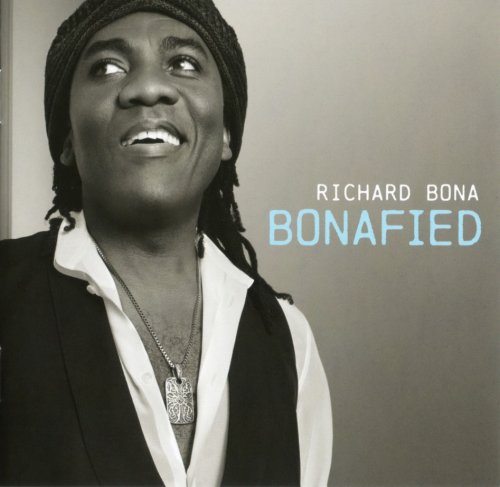
Artist: Richard Bona
Title: Bonafied
Year Of Release: 2013
Label: Universal Music France – 3736377
Genre: Jazz / World
Quality: FLAC (tracks + .cue, log, scans)
Total Time: 52:42 min
Total Size: 301 MB
WebSite: Album Preview
Tracklist:Title: Bonafied
Year Of Release: 2013
Label: Universal Music France – 3736377
Genre: Jazz / World
Quality: FLAC (tracks + .cue, log, scans)
Total Time: 52:42 min
Total Size: 301 MB
WebSite: Album Preview
01. Dunia E [05:00]
02. Mut'Esukudu [06:10]
03. Akwappella [03:16]
04. Janjo La Maya [05:21]
05. Mulema [04:39]
06. Uprising Of Kindness [04:01]
07. Tumba La Nyama [04:30]
08. Diba La Bobe [05:19]
09. La Fille D'A Cote [04:06]
10. Socopao [05:55]
11. On The 4th Of July [04:11]
"It's not cool to be impressed by the latest whiz kid to hit town. But even the hippest of the hip give it up when the subject turns to Richard Bona, a slight, shy virtuoso of the electric bass guitar from a mud-hut village deep in Cameroon." - Newsweek
There's a lot of talk these days about the future of music: the blending of old and new, the cross-pollination of cultures, the blurring of genres. There aren't many musical artists who inhabit both the past and the future as fully as Richard Bona. There aren't many who've made themselves at home in so many different places. He's lived in skyscrapers and chateaus and huts. He's performed in Paris, Mumbai, and Sydney. He's run for his life with a panther at his heels. He knows how to operate ProTools through an SSL console and how to trap an animal.
As we stumble toward a new era, words like international and universal have begun to seem quaint, yet we are still daunted by our constantly expanding horizons. We need help to embrace our rapidly unfolding history and move forward. We need artists like Richard Bona to sing us funny and serious songs about human nature, about the big, surprising world and the familiar places we call home. We need his music to make our blood run faster and our hearts beat more insistently. At the Hollywood Bowl with Quincy Jones, at the United Nations with Herbie Hancock for the first International Jazz Day, introducing his new Afro-Cuban band to audiences in Tokyo, Moscow, and New York, Richard Bona is out there on the road, mapping our route from the past to the future.
"Like many African songwriters, he sings lessons and parables. The language of his music is less specific; it draws on pop and jazz from across Africa, the Americas and Europe. His songs assume a virtuosity so complete that it only has to whisper." - The New York Times
Richard Bona sings mostly in his native Douala, but the vulnerability of his plaintive sound is unmistakable across barriers of language. His bass solos are wildly inventive, fervently imitated and transcribed by young musicians all over the world. His tunes combine African polyrhythms, harmonic virtuosity, and a pop songwriter's gift for memorable, accessible melodies. His arrangements are almost symphonic, hypnotizing us with the unexpected colors of voices and instruments. All of this is no happy accident. For Richard Bona, the life of a musician is not a casual undertaking. He understands his job: to make us dance and laugh and cry, to help us understand ourselves and each other, to remind us that we live in an enormous universe filled with wonders, to fill us with joy. For Richard Bona, being a musician is a responsibility he's trained for all his life, a lineage he was born to fulfill.
Richard Bona was born in the Cameroonian village of Minta. When the infant Bona came down with malaria, his family discovered that only the sound of the balafon could soothe him. When he recovered, his grandfather, the village griot, showed him how to build his own instrument. He played for hours every day, and by the age of five he was performing regularly. He could play any instrument he heard: flute, hand percussion, drums. When Bona was 11 his family moved to the big city of Douala, and Bona fell in love with the sound of the guitar. He built himself a 12-string, using bicycle brake cable for strings. Soon he was playing in local bikutsi and makossa bands. Then fate intervened when a French jazz club opened at a local hotel. The patron of the establishment sought out the talented kid he'd heard about and asked him to put together a band. Bona knew nothing about jazz at the time, but he needed the gig. Fortunately, the club owner had over 500 records. Bona spent his days listening and his nights trying out what he had learned. One of the first things he heard was the 1976 album Jaco Pastorius, and it changed his life forever.
"Imagine an artist with Jaco Pastorious's virtuosity, George Benson's vocal fluidity, Joao Gilberto's sense of song and harmony, all mixed up with African culture. Ladies and gentlemen, we bring you Richard Bona!"—Los Angeles Times
A decade later Bona would be hired to fill the legendary bass player's shoes in Joe Zawinul's band. Throughout the 1990s Richard Bona's musicianship and virtuosity became urban legend in Paris and New York. Bona played with Afropop stars Manu Dibango and Salif Keita. He toured and recorded with Pat Metheny, Joe Zawinul, Didier Lockwood, Harry Belafonte, Quincy Jones, Herbie Hancock, Chick Corea, Steve Gadd, Michael Brecker, Randy Brecker, Chaka Khan, Jacques Higelin, Shankar Mahadevan, Tito Puente, Chucho Valdes, Mike Stern, Larry Coryell, David Sanborn, Kenny Garrett, Joe Sample, Harry Connick Jr., Raul Midon, Billy Cobham, Queen Latifah, Branford Marsalis, Bobby McFerrin, Chick Corea, and Sadao Watanabe. He released seven albums -- Scenes From My Life (Columbia, 1999), Kaze Ga Kureta Melody (Sony, 2000), Reverence (Columbia Europe, 2001), Munia: The Tale (Verve 2003), Kiki (Decca, 2006), Bona Makes You Sweat (Decca, 2010), and The Ten Shades of Blues (Decca, 2010) - establishing himself as a singer-songwriter with a singular voice. His Afro-Caribbean project Toto Bona Lokua (w/Gerald Toto and Kanza Lokua, Sunnyside, 2005) and his Afro-Cuban project Mandekan Cubano weave together disparate roots, alchemizing ancient traditions into surprising new forms.
Bona's grandfather taught him early and well. Music is a language that cuts through our ordinary experience, tells us the stories we need to hear, leads us to understand who we are. Richard Bona is following in his grandfather's footsteps, the griot for our sprawling global village. In basement clubs and festival tents and grand concert halls, we gather to celebrate, dance and sing. Richard Bona's music propels us forward.
There's a lot of talk these days about the future of music: the blending of old and new, the cross-pollination of cultures, the blurring of genres. There aren't many musical artists who inhabit both the past and the future as fully as Richard Bona. There aren't many who've made themselves at home in so many different places. He's lived in skyscrapers and chateaus and huts. He's performed in Paris, Mumbai, and Sydney. He's run for his life with a panther at his heels. He knows how to operate ProTools through an SSL console and how to trap an animal.
As we stumble toward a new era, words like international and universal have begun to seem quaint, yet we are still daunted by our constantly expanding horizons. We need help to embrace our rapidly unfolding history and move forward. We need artists like Richard Bona to sing us funny and serious songs about human nature, about the big, surprising world and the familiar places we call home. We need his music to make our blood run faster and our hearts beat more insistently. At the Hollywood Bowl with Quincy Jones, at the United Nations with Herbie Hancock for the first International Jazz Day, introducing his new Afro-Cuban band to audiences in Tokyo, Moscow, and New York, Richard Bona is out there on the road, mapping our route from the past to the future.
"Like many African songwriters, he sings lessons and parables. The language of his music is less specific; it draws on pop and jazz from across Africa, the Americas and Europe. His songs assume a virtuosity so complete that it only has to whisper." - The New York Times
Richard Bona sings mostly in his native Douala, but the vulnerability of his plaintive sound is unmistakable across barriers of language. His bass solos are wildly inventive, fervently imitated and transcribed by young musicians all over the world. His tunes combine African polyrhythms, harmonic virtuosity, and a pop songwriter's gift for memorable, accessible melodies. His arrangements are almost symphonic, hypnotizing us with the unexpected colors of voices and instruments. All of this is no happy accident. For Richard Bona, the life of a musician is not a casual undertaking. He understands his job: to make us dance and laugh and cry, to help us understand ourselves and each other, to remind us that we live in an enormous universe filled with wonders, to fill us with joy. For Richard Bona, being a musician is a responsibility he's trained for all his life, a lineage he was born to fulfill.
Richard Bona was born in the Cameroonian village of Minta. When the infant Bona came down with malaria, his family discovered that only the sound of the balafon could soothe him. When he recovered, his grandfather, the village griot, showed him how to build his own instrument. He played for hours every day, and by the age of five he was performing regularly. He could play any instrument he heard: flute, hand percussion, drums. When Bona was 11 his family moved to the big city of Douala, and Bona fell in love with the sound of the guitar. He built himself a 12-string, using bicycle brake cable for strings. Soon he was playing in local bikutsi and makossa bands. Then fate intervened when a French jazz club opened at a local hotel. The patron of the establishment sought out the talented kid he'd heard about and asked him to put together a band. Bona knew nothing about jazz at the time, but he needed the gig. Fortunately, the club owner had over 500 records. Bona spent his days listening and his nights trying out what he had learned. One of the first things he heard was the 1976 album Jaco Pastorius, and it changed his life forever.
"Imagine an artist with Jaco Pastorious's virtuosity, George Benson's vocal fluidity, Joao Gilberto's sense of song and harmony, all mixed up with African culture. Ladies and gentlemen, we bring you Richard Bona!"—Los Angeles Times
A decade later Bona would be hired to fill the legendary bass player's shoes in Joe Zawinul's band. Throughout the 1990s Richard Bona's musicianship and virtuosity became urban legend in Paris and New York. Bona played with Afropop stars Manu Dibango and Salif Keita. He toured and recorded with Pat Metheny, Joe Zawinul, Didier Lockwood, Harry Belafonte, Quincy Jones, Herbie Hancock, Chick Corea, Steve Gadd, Michael Brecker, Randy Brecker, Chaka Khan, Jacques Higelin, Shankar Mahadevan, Tito Puente, Chucho Valdes, Mike Stern, Larry Coryell, David Sanborn, Kenny Garrett, Joe Sample, Harry Connick Jr., Raul Midon, Billy Cobham, Queen Latifah, Branford Marsalis, Bobby McFerrin, Chick Corea, and Sadao Watanabe. He released seven albums -- Scenes From My Life (Columbia, 1999), Kaze Ga Kureta Melody (Sony, 2000), Reverence (Columbia Europe, 2001), Munia: The Tale (Verve 2003), Kiki (Decca, 2006), Bona Makes You Sweat (Decca, 2010), and The Ten Shades of Blues (Decca, 2010) - establishing himself as a singer-songwriter with a singular voice. His Afro-Caribbean project Toto Bona Lokua (w/Gerald Toto and Kanza Lokua, Sunnyside, 2005) and his Afro-Cuban project Mandekan Cubano weave together disparate roots, alchemizing ancient traditions into surprising new forms.
Bona's grandfather taught him early and well. Music is a language that cuts through our ordinary experience, tells us the stories we need to hear, leads us to understand who we are. Richard Bona is following in his grandfather's footsteps, the griot for our sprawling global village. In basement clubs and festival tents and grand concert halls, we gather to celebrate, dance and sing. Richard Bona's music propels us forward.
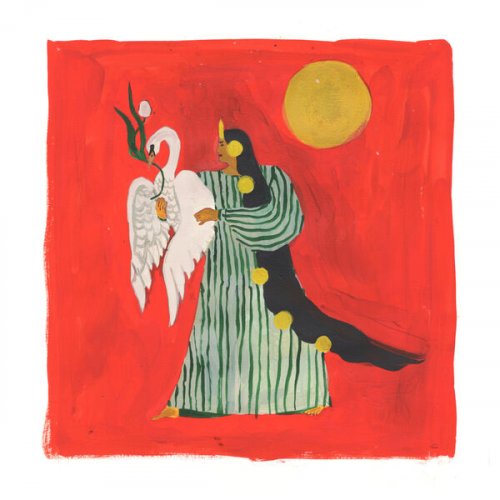
![Manu Delago & Max ZT - Deuce (2026) [Hi-Res] Manu Delago & Max ZT - Deuce (2026) [Hi-Res]](https://img.israbox.com/img/2026-02/19/v5s18xsisjkqnsg5od9qlgck5.jpg)
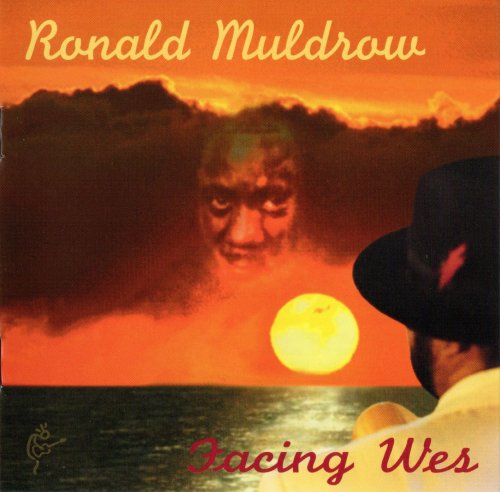
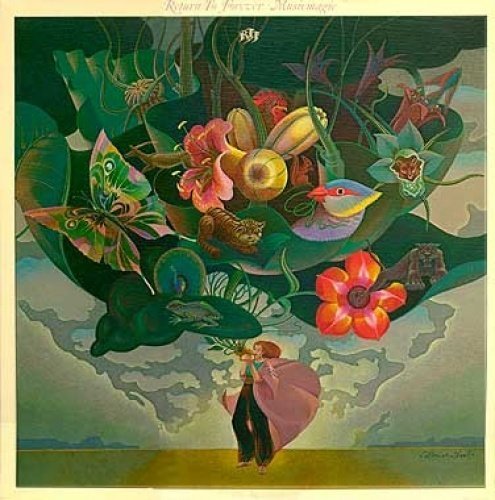
![Matt Monro - Matt Sings Monro (Live at the BBC, Remastered 2023) [Hi-Res] Matt Monro - Matt Sings Monro (Live at the BBC, Remastered 2023) [Hi-Res]](https://www.dibpic.com/uploads/posts/2026-02/1771586614_k3yj19donljhc_600.jpg)
![Vivian Rosie - Twilight Voodoo (2026 Remaster) [Hi-Res] Vivian Rosie - Twilight Voodoo (2026 Remaster) [Hi-Res]](https://www.dibpic.com/uploads/posts/2026-02/1771389602_cover.jpg)
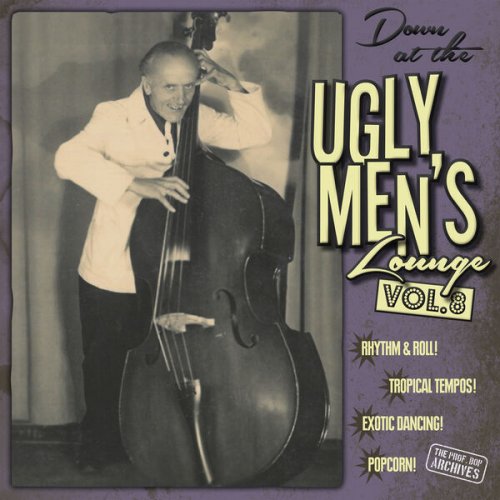
![Matt Monro - The Nearness Of You (2015) [Hi-Res] Matt Monro - The Nearness Of You (2015) [Hi-Res]](https://www.dibpic.com/uploads/posts/2026-02/1771594612_cover.jpg)
![Kento Tsubosaka - Lines (2026) [Hi-Res] Kento Tsubosaka - Lines (2026) [Hi-Res]](https://www.dibpic.com/uploads/posts/2026-02/1771391986_zw4gprxc9nex6_600.jpg)